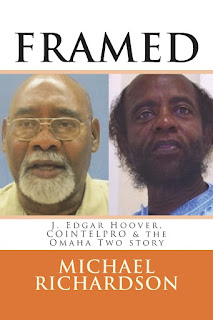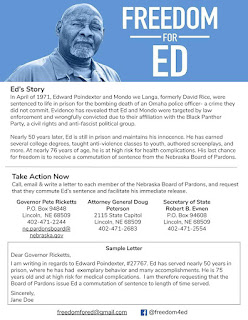50 yrs ago: Confessed bomber names Raleigh House as provocateur at Ed Poindexter's trial
Fifty years ago, April 5, 1971 marked the second week of testimony in the controversial murder trial of Edward Poindexter and David Rice (later Wopashitwe Mondo Eyen we Langa) charged with the bombing death of Patrolman Larry Minard. Confessed bomber sixteen year-old Duane Peak testified that Raleigh House, the treasurer of the National Committee to Combat Fascism, drove him to pick up the dynamite and suitcase used to construct the deadly device. However, House had an out in the prosecutor’s office, Deputy County Attorney Arthur O’Leary, and only spent one night in jail and was never charged in Minard’s murder.
Peak testified that he went with House to his home. “Rollie parked his car and went in the house and told me to wait.”
Peak said he waited about fifteen minutes until Raleigh returned to the car. “Rollie came from behind the house with a suitcase. He brought it out to the car and put it in the back seat. It was a large suitcase and it was gray.”
“We went down to the street behind David’s house….Rollie instructed me to take the suitcase over to the back door of David’s house….I knocked on the door and Edward Poindexter came from around the side of the house, and David opened the back door.”
“Ed set the suitcase on the floor and opened it.”
“There were sticks of dynamite.”
Another version Peak earlier told police had Raleigh House bring the suitcase out the front door instead of from the back. The discrepancy was not explored by defense attorneys.
House’s first appearance in the case was when he was picked up in the week after the August 17, 1970 bombing during a police dragnet of the Near Northside. Raleigh House was released from jail on a signature bond authorized by Arthur O’Leary after one night in custody. House had been held with $10,000 bail after being booked on suspicion of conspiracy to commit murder. O’Leary would not comment on House’s release.
The preferential treatment of Raleigh House and lack of prosecution for supplying the suitcase and dynamite to Duane Peak suggests House was an informant. Mondo later wrote about House. “Of course, it’s possible he was an informant. I haven’t given that much thought, he was one of four people who could have been charged.” The four people mentioned by Mondo were Raleigh House, Donald Peak, Jr., Robert Cecil, and Frank Peak.
Raleigh House was well known by Omaha police and his name came up in Congressional testimony by Captain Murdock Platner in October 1970. Iowa Representative William Scherle asked Platner if he was familiar with House.
“Yes, sir; he is the treasurer, the original treasurer of the Black Panther Party, and he is the minister of finance in this National Committee to Combat Fascism at this time.” Platner failed to mention that Duane Peak had identified House as the supplier of the dynamite and suitcase for the bomb that killed a policeman.
Neither Duane Peak, who admitted planting the bomb in a vacant house, nor Raleigh House, who Peak said gave him the bomb-making supplies, were prosecuted for murder. Peak got off with a couple of years in juvenile detention and House only did a single night during the dragnet. Ed Poindexter, who denies any role in the crime, was sentenced along with Mondo to life imprisonment at hard labor.
Mondo died at the Nebraska State Penitentiary in March 2016. Ed Poindexter remains at the maximum security prison, now in his fiftieth year of incarceration. Poindexter has a commutation of sentence request pending with the Nebraska Pardon Board, however the chairman is Governor Pete Ricketts who says Poindexter needs to wait for a hearing next year because the panel must first hear restoration of rights requests from former prisoners.
More information on Ed Poindexter is available in the book FRAMED: J. Edgar Hoover, COINTELPRO & the Omaha Two story, in print edition at Amazon and in ebook format. Portions of the book may also be read free online at NorthOmahaHistory.com. The book is also available to patrons of the Omaha Public Library.
Get Involved
If you'd like to help with maintaining or developing the website, contact us.
Publish
Publish your stories and upcoming events on Indybay.








